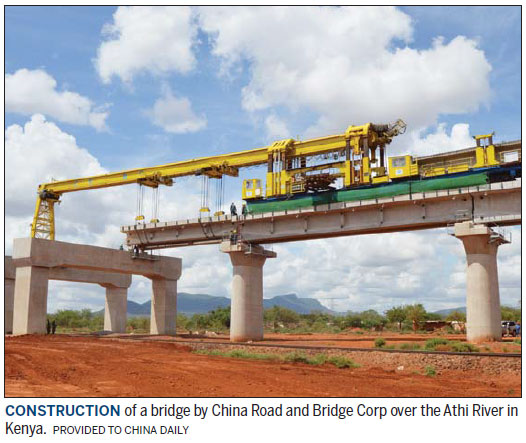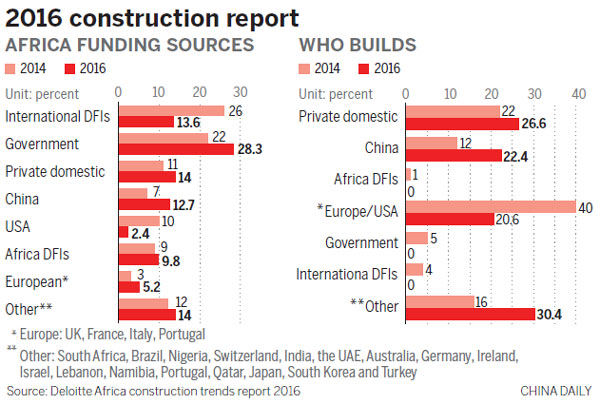China plays major role in infrastructure

Report shows projects moving ahead, as competitive contributions from other sources around the globe fall behind
China has emerged as the single biggest contributor to Africa's infrastructure projects providing $41 billion, according to a recent report released by Deloitte, an international consultancy.
The report also underscores China's strong participation in the continent's modernization by competing closely with domestic firms in large-scale construction projects valued at billions of dollars.
According to the report, entitled Africa's Changing Infrastructure Landscape; Africa Construction Trend Report 2016, China's funding increased from 7 percent in 2014 to 12.6 percent coming against the backdrop of decreased contributions from international development funding institutions from 26 percent to 13.6 while governments increased their spending from 22 percent to 28.3 percent, funding 81 projects from 2014 to 2016. The United States' contribution fell from 10 percent in 2014 to 2.4 percent last year while the European bloc, which contributed 3 percent two years ago, was broken down to the UK at 2.8 percent and France at 2.4 percent.

While stating that investment in infrastructure and capital projects is an important aspect for enabling GDP growth, the report hinted that Africa's ambitious growth may be hinged on China's increased participation.
"Over the past one and a half decades, China has become increasingly important to Africa's macroeconomic performance as the continent's major trade partner and an important source of investment flows," says Jean-Pierre Labuschagne, Deloitte Africa lead for infrastructure and capital projects, based in Nairobi.
The report, released in Kenya and South Africa, says that increased uncertainties following the UK's decision to leave the EU, financial and geopolitical troubles as well as sluggish global demand will inhibit Africa's future growth, further delaying some infrastructure projects. This makes official development assistance in the form of grants and concessional loans Africa's largest source of public finance and an important driver of infrastructure and capital projects on the continent.
"Chinese lenders in the form of the Export-Import Bank of China and the China Development Bank continue to grow in importance in terms of the value of funding provided, as well as the cross-sectoral nature of funding now emerging," the report says.
It also lays emphasis on the New Development Bank, formed in 2014 by the BRICS nations (Brazil, Russia, India, China and South Africa), saying that it will likely become an important source of funding for African infrastructure projects going forward.
As of last year, the greatest number of projects was in the transport sector (33.6 percent), followed by real estate (22.4 percent), energy and power (21 percent) and shipping and port (8.4 percent). Projects in mining saw an upswing to 2.8 percent, while oil and gas decreased to 4.5 percent.
"Private domestic companies are constructing 76 projects, while Chinese companies are busy with 64. Italian firms are building 18 and French companies 14. Portuguese and South African firms are each building 10," the report says.
With depressed economic growth of 3.5 percent, the number and value of projects witnessed a downturn in Sub-Saharan Africa. The number qualifying for inclusion fell by 5 percent while the value decreased by 14 percent, due in large part to the global headwinds faced by countries, the report says. Only projects valued at $50 million or above were reviewed.
As a region, West Africa had the largest number of projects. However, South Africa was the single country with the largest number of projects (41) followed by Nigeria (38).
China's presence is heavily felt in East Africa where it is responsible for building 18 projects followed by 16 in West Africa and 15 in Southern Africa. More of its funding, however, went to West Africa where it expended $13.1 billion followed by $7.6 billion in Southern Africa.
Conversely, East and Southern Africa recorded a downturn in the number and value of projects. This was also experienced in West Africa.
The annual Deloitte Africa Construction Trends report monitors progress on capital-intensive infrastructure on the continent. To qualify for inclusion, infrastructure projects are required to be valued at over $50 million and to have broken ground but are yet to be commissioned as of June 1, 2016.
lucymorangi@chinadaily.com.cn

(China Daily Africa Weekly 02/17/2017 page27)
Today's Top News
- Crossing a milestone in the journey called Sinology
- China-Russia media forum held in Beijing
- Where mobility will drive China and the West
- HK community strongly supports Lai's conviction
- Japan paying high price for PM's rhetoric
- Japan's move to mislead public firmly opposed






























